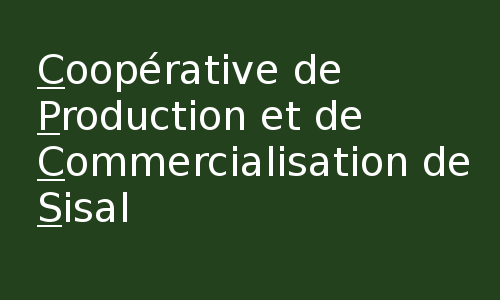On February 27, 2015, the National Council on Cooperatives (Conseil National des Cooperatives [CNC]) issued an "Autorisation de Fonctionnement" (an Authorization to Function) to the Coopérative de Production et de Commercialisation de Sisal (CPCS). In effect, this authorization gives the cooperative the right to exist under Haitian law. This legal status gives the organization the right to enroll members, own property, and function in all legal ways under the Haitian legislation defining and governing cooperatives. Cooperatives are designed to allow Haitian citizens to band together and help one another accomplish a specified purpose. The purpose of this cooperative is to encourage production and commercialization of the fiber extracted from the plant agave sisalana, commonly known as sisal.
Sisal has a long history in Haiti. Because of its ability to flourish in times of rain or drought, it grows well in Haiti's climate. It was once produced on large plantations in Haiti, but the introduction of synthetic fibers nearly killed the sisal market. Reduced demand for the natural fiber caused prices to plummet and large and small operations ceased production. Sisal gardens were left untended and often replaced by small trees used to produce charcoal.
After years of producing synthetic fibers, people all over the world have begun to realize that producing tons of material that is not biodegradable creates a huge waste problem. Synthetics also depend on petroleum and have a fairly high carbon footprint. Therefore natural fibers are staging a comeback or return to favor. This has caused prices for the natural commodity to augment making production once again feasible. In addition, much research has led to new markets for sisal. Once used mainly for cording, particularly agriculture cording, sisal is now finding use in reinforcement of plastics and concrete, in paper production, and is woven into beautiful carpets that are used worldwide.

CPCS has a vision of helping farmers produce sisal in small plots, providing access to decortication equipment for extracting the fiber from plant leaves, and helping cooperative members to join the world market and get a fair price for their product. Sisal production involves a lot of hand work. Fields must be planted and maintained, leaves must be harvested by hand, fiber must be extracted from the leaves and washed and dried in the sun. The fiber must be brushed and baled for export. All of these steps create much needed jobs for Haitian workers. Jobs create income and enable families to feed, clothe and educate their children.
With the assistance of West End Baptist Church in Virginia, the founders of the cooperative have organized and positioned themselves to grow with the sisal resurgence. Artisans in Haiti who are accustomed to producing a variety of handmade, quality items are joining the cooperative to buy fiber and sell their products on the world market. Working together, the members of the cooperative hope to make great progress one small step at a time.
Inquiries about the work of the cooperative and the availability of products should be addressed to the cooperative's president, Esau Jean Pierre at:
CPCS
This email address is being protected from spambots. You need JavaScript enabled to view it.


